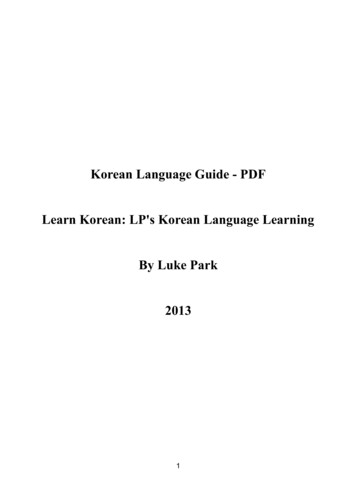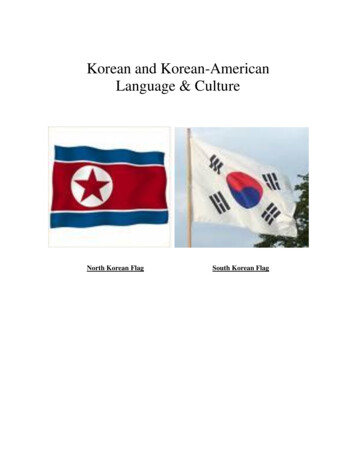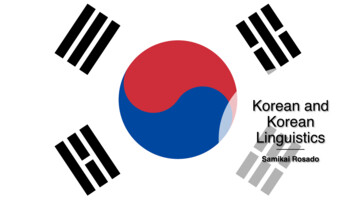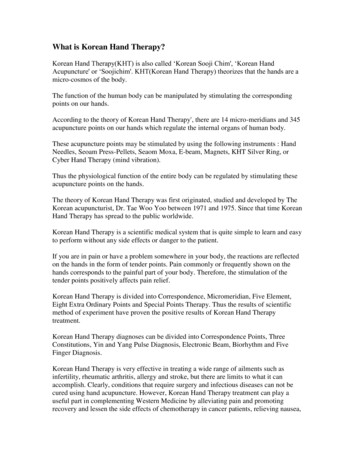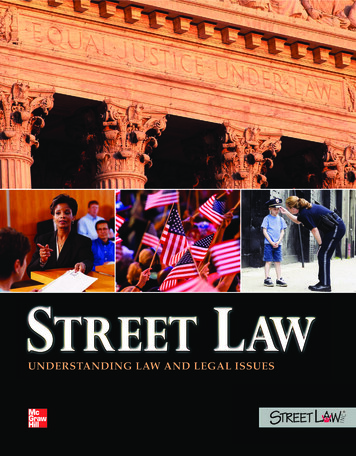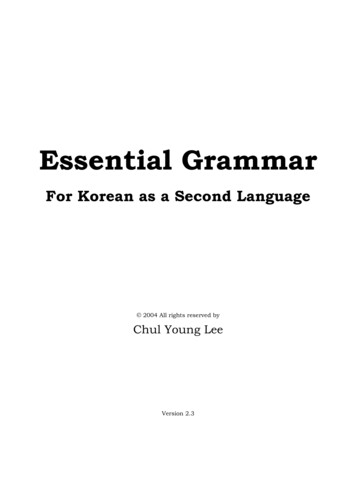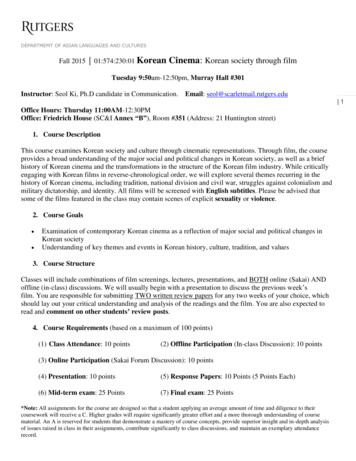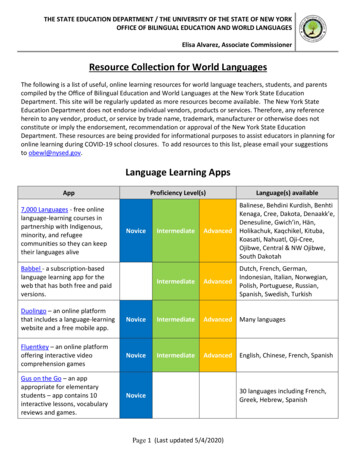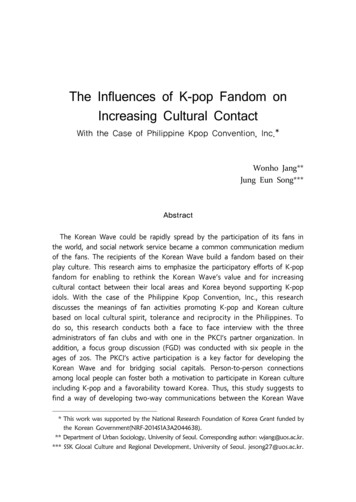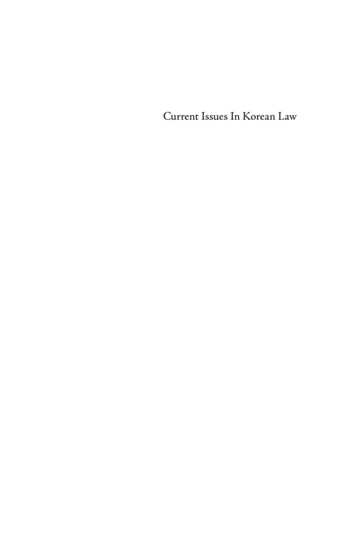
Transcription
Current Issues In Korean Law
Studies in Compar ativ e Legal HistoryCurrent Issues in Korean LawEdited byLaurent MayaliandJohn YooThe Robbins Collection2014
Robbins Collection PublicationsSchool of Law (Boalt Hall)University of California at BerkeleyBerkeley, California 94720(510) 642-5094 (510) 642-8325http://www.law.berkeley.edu/robbins 2014 by the Regents of the University of California, The Robbins Religiousand Civil Law Collection, School of Law (Boalt Hall), University of Californiaat Berkeley.All Rights Reserved.This book is printed on acid-free paper.isbn 1-882239-22-9978-1-882239-22-1Library of Congress Cataloging-in-Publication Data
ContentsThe Past and Future of Constitutional Adjudication in KoreaKang-Kook Lee1Judicial Intervention in Policy-Making by the Constitutional Court inKoreaJibong Lim15The Justifiability and Limits of Judicial GovernanceHong Sik Cho49The State of Fundamental Rights Protection in KoreaDai-Kwon Choi87The Unconstitutionality of the Crime of Sodomy Under Article 92(5) ofthe Korean Military Penal CodeKuk Cho125Mergers and Acquisitions in the Corporate Reorganization Procedures ofKoreaJaewan Park141The Best Evidence Rule in a Digital AgeSang Won Lee163
Prefacevii
viiiPreface
Prefaceix
xPreface
The Past and Future of ConstitutionalAdjudication in KoreaKang-Kook Lee1The Constitution andConstitutional AdjudicationWe learn from the history of mankind that it is only after the establishment of the constitution that the guarantees for the rights of citizens andthe limits on government power of a liberal democracy can be built on afirm legal foundation. It was also the constitution that brought law andorder and the social integration that respected and protected the socially disadvantaged. The ideals of constitutional democracy that checks andbalances state powers and guarantees for individual liberty, equality, andjustice, are a valuable asset of our humanity.However, the supremacy of the constitutional guarantees for citizens’freedom and rights have often been infringed or restricted by state actionsor governmental authority. For this reason, the luminaries of mankind created a constitutional adjudication system to effectively protect the constitution as an instrument for people to pursue happiness while enjoying human dignity and worth. This development has allowed the nominal, formalconstitution to become a living norm in people’s everyday lives, as well as astandard for controlling the exercise or abuse of state power. The constitu1.Former President, Constitutional Court of Korea.1
2Kang-Kook Leetion also led to the advancement of democracy and the rule of law by mediating and integrating ideological conflicts and confrontations. Moreover,the constitutional court came to serve as the focal point that assimilatesand integrates state and society into one political entity. Accordingly, mostof the advanced democratic welfare states today are equipped with systematic and stable constitutional adjudication systems, and in that sense, wemay be able to define today’s era as the era of constitutional adjudication.With respect to the constitutional adjudication system that protectsconstitutional ideals and values of guaranteeing citizens’ fundamentalrights, I wish to briefly introduce the establishment of the ConstitutionalCourt of Korea, its past decisions, its contribution to the development ofKorean society, and the direction of the Court in the future.Footsteps of the ConstitutionalCourt of Kor eaIn 1987, the people of Korea expressed their strong aspiration to demolishthe long-standing authoritarian regime and build a democratic state embodying freedom, human rights, equality, and justice. This public demandproduced the ninth Korean Constitution, which led to the establishmentof a constitutional court designed to safeguard the long-neglected basicrights of citizens and to effectively control the abuse of state power.Though the constitutional review system formally existed prior to itsestablishment in September, 1988, it was nominal and had held merely fourstatutes unconstitutional over 40 years of its existence. In those years, thenotions of constitutional supremacy and fundamental rights of the peoplewere merely formal, and constitutional control over state power remainedpassive and limited. As a result, many doubted that the new ConstitutionalCourt would be able to properly fulfill its function.Despite various forms of challenges presented before the Constitutional Court during its early period, the Court consistently stressed andreaffirmed the principles and values of the constitution as the supreme,fundamental law of the nation. At the same time, it renewed people’s understanding of the raison d’être and the value of constitutional justice byemphasizing the state’s duty to protect human dignity and worth and to
Constitutional Adjudication3guarantee citizens’ fundamental rights. By earning the trust of the peoplewho had long desired the rule of law and the guarantee of fundamentalhuman rights, the Court was able to establish itself as an important institution of stature and influence.From the early days of its inception, the Constitutional Court broadly read the legal requirements for a constitutional petition and expandedthe scope of its jurisdiction to include statutes and government decrees inan effort to invigorate the function of constitutional adjudication. As a result, the number of cases filed increased every year from as few as 425 casesin 1989 to 1,720 cases by the year 2010. As of August 31, 2012, 22,826 caseshad been filed and the Court handled approximately 21,272 cases, in which457 cases found some government action to be unconstitutional, 146 casesheld a law to be unconformable to the constitution, 63 cases ruled a lawunconstitutional as applied, and 28 cases found a law conditionally constitutional. Moreover, there are now 417 cases where the Court has decided aconstitutional complaint in favor of the plaintiff.Corresponding to the efforts and commitment of the ConstitutionalCourt, the constitution in Korea is no longer a mere ornament in the codeof laws; it has become a living norm in our daily lives and a standard for controlling state powers. The Constitutional Court thereby came to be a trustworthy guardian of constitutional principles and values that form the normfor integration of social conflicts. In recent polls, the Constitutional Courthas been chosen as the most trusted and influential government institutionin Korea, reflecting Korean citizens’ appreciation of the Court’s efforts.A New For m of Constitutional A ppealPr escr ibed by Article 68, Section 2 of theConstitutional Court ActArticle 68, Section 2 of the Constitutional Court Act prescribes a specialform of constitutional complaint, also known as the “norm-control,” whichis one of the institutional factors that enabled early stabilization of the constitutional adjudication system in Korea and that facilitated public recognition of constitutional review as the last resort in protecting individuals’fundamental rights.
4Kang-Kook LeeAs mentioned earlier, Korea followed Germany and several Europeancountries in adopting a constitutional court system that plays an importantrole in protecting the constitution and safeguarding people’s basic rights in1987, as a result of people’s strong desire for an actualization of the rule oflaw and reinforcement of the guarantee of people’s basic rights.The participants of the 1987 constitutional amendments adoptedthe constitutional court system based on the Basic Law for the FederalRepublic of Germany. However, they simply included a broad provisioncreating an appeal system by which people may directly seek legal remediesfor the violation of their constitutional rights in the Constitutional Court,and delegated all the specifics and procedural steps to the legislature. Consequently, the legislators who were authorized to formulate the detailsand procedures of the constitutional complaint system heatedly debatedwhether to adopt a key element of the German model—judicial review ofdecisions of ordinary courts.Each country has its own structure and method for the constitutional complaint. For instance, Austria, which established the world’s firstindependent constitutional court in 1920, only allows constitutional complaints for administrative actions while Germany permits constitutionalreview of court decisions. Germany’s approach is now accepted as a standard form of constitutional petition throughout the world. The Germansystem requires complete exhaustion of all legal remedies against state actions available in ordinary courts first before the constitutional court canreview whether the judgment of appellate courts and the Supreme Courtregarding the lower courts’ interpretation or application of laws violatedthe constitutional rights of citizens.When Korea was considering the adoption of a constitutional court,the Korean courts were already exercising jurisdiction with the accumulated experience and excellent human and material resources of nearly 100years. Thus, it was hard for courts to accept the idea that their decisionswill be reviewed by a constitutional court, a fledgling institution. Moreover,unlike Germany where the constitutional court functions as the nation’shighest court in the hierarchy of the court system under the constitution,Korea envisioned its constitutional court as a separate branch of state powers with independent jurisdiction. This emphasis on the separateness andindependence of the constitutional court was also somewhat problematic
Constitutional Adjudication5as a matter of legal principles for the constitutional court to exercise jurisdiction for constitutional complaints.In this context, the legislators devised a new avenue for filing a constitutional complaint by prescribing in Article 68(2) of the ConstitutionalCourt Act that any party to an ordinary court proceeding has recourse tothe Constitutional Court to receive a final decision on the constitutionalityof the statutes that were rejected by the court of original jurisdiction. Thisis in addition to the general constitutional complaint system where peopleare entitled to file a complaint when their fundamental rights have beeninfringed by the government’s exercise or non-exercise of its power.In other words, under the typical German system, courts file a motion with the constitutional court only when they are certain about theunconstitutionality of statutes at issue in pending trials. Otherwise, theyproceed with the trials according to the constitutional interpretation oflaws and their rulings may eventually be subject to review by the appellatecourts. Under this system, a party to a case must exhaust all legal recoursebefore requesting the constitutional court to review the constitutionalityof the ordinary courts’ interpretation and application of the disputed law.However, under the Korean system, a party can immediately file a constitutional complaint under Article 68(2) and need not wait for the judgmentfrom an appellate court when a court dismisses the party’s motion requesting constitutional review of a disputed statute in a pending trial. Put differently, the party can have the constitutionality of the statute reviewedeven in lower court proceedings and promptly prevent or remedy the trialcourt’s erroneous ruling on the constitutionality of a statute which mayinfringe the party’s constitutional rights. Hence, a party to a case can obtain a legal remedy either through the binding effect of the ConstitutionalCourt’s decision if the ordinary court proceedings are yet to be finalized orthrough initiating a retrial if the proceedings are finalized.The reason for introducing an alternative avenue of constitutionalcomplaint was to enable people to directly request that the ConstitutionalCourt review the constitutionality of disputed statutes in pending trialsbecause ordinary courts were extremely passive in exercising their constitutional review powers. Accordingly, there were scarcely any filed motionsfor the constitutional review of laws. And this meant that litigants hadlittle, if any, real opportunity to have the Constitutional Court review the
6Kang-Kook Leeconstitutionality of disputed statutes. The operation of this complaint system for about 10 years reveals that the public largely resorts to this avenue;requests for constitutional review under Article 68(2) accounted for about40% of the total constitutional complaints and 11.8% of these complaintswere held in favor of the plaintiffs. This is a much higher rate than the rateby which general constitutional complaint cases in both Korea and Germany find in favor of plaintiffs—2.9% and 2.4% respectively.Korean scholars positively evaluate this form of constitutional complaint as an unprecedented system unique to Korea. Academics concludethat it has played a major role in effectively addressing the problems of thenorm control system and providing expeditious assistance in guarding thepeople’s basic rights, activating constitutional adjudication, and stabilizingthe Constitutional Court.Even practitioners and scholars of other countries assess Korea’s constitutional complaint system to be an effective scheme in promoting constitutional justice and raising people’s awareness for countries with newlyformed constitutional courts. Moreover, they deem that such a system canadequately adjust the inevitable conflicts between a newly created constitutional court and ordinary courts.The Impact of the Constitutional Court ofKor ea on Political and S ocial Dev elopmentOne of the most critical accomplishments of the Constitutional Court ofKorea over the past 24 years is the Court’s performance of its duty of safeguarding constitutional principles and values by guaranteeing its citizens’freedom and basic rights and controlling the state’s abuse of powers.Moreover, the government agencies involved in the legislative processhave recognized the importance of preliminary constitutional review. Statutes used as a tool to sustain the past authoritarian regime or to protect theinterests of special groups have been declared void by the ConstitutionalCourt. The public now also believes that the constitutional review of governmental action is a way to protect the freedom and fundamental rightsof the people, as well as the constitution as the supreme law of the nation.The Constitutional Court’s landmark decisions have found uncon-
Constitutional Adjudication7stitutional: 1, a provision of the Social Protection Act that mandates protective custody for criminal offenses irrespective of punishment; 2, a provision of the Criminal Procedure Act that maintains the effect of an arrestwarrant even when the defendant is later found not guilty if he or she wassentenced to a severe punishment; 3, a provision of the Correctional Administration Act that compels a prison guard to attend a meeting betweena pretrial detainee and his/her defense counsel; and 4, a provision of theNational Security Act that criminally punishes those who praise, incite orproduce expressive materials for anti-government organizations.Meanwhile, as the legal legacies of the past authoritarian regime tosome extent disappeared, an increasing number of high-profile cases thatcould influence the course of social stability and the future of the nationwere brought before the Constitutional Court. Issues of great national andsocial importance arising from the political, economic, and social sectorsthat failed to be resolved through satisfactory dialogue and compromise inthe political process came to the Constitutional Court for judicial review.This distorted the decision-making process of a democratic political system,which also raised serious questions regarding the separation of powers andthe limitation of constitutional review.Major decisions during this time include: 1, holding the statute forthe relocation of Korea’s capital unconstitutional; 2, dismissing healthrequirements for imports of U.S. beef; 3, invalidating a provision of thePublic Election Act which denied the voting rights of Korean people livingoverseas; and 4, ruling unconstitutional criminal penalties for conscientious objectors to military service and a statutory ban on night time outdoor rallies and assemblies. In handling these cases, the Court modifiedits pleading and procedures and developed more universal and compellingreview standards that improved the predictability of its decisions and thepeople’s trust in the Constitutional Court. Further, the Court strengthened the necessity and legitimacy of constitutional review throughout thistime.Recently, the Court strengthened its control over legislative procedures as well as substantive matters of law. In a suit brought by a congressman of the opposition party against the chairman of the NationalAssembly, a congressman claimed that the majority party railroaded a billthrough the legislature. The Constitutional Court held that the chairman
8Kang-Kook Leewould have violated assembly members’ right to vote on a bill if the votingproceeded under significant impairment in freedom and fairness. Hence,the Court emphasized the procedural legitimacy of laws over the autonomy of the National Assembly in its proceedings. This accelerated the realization of democracy within the National Assembly and the advancementof political democracy in Korea.The R el ationship bet w een the ConstitutionalCourt and the O ther CourtsThe constitution of Korea separates judicial functions between the ordinary courts and the Constitutional Court by distinguishing between thejudicial power of the Supreme Court of Korea, the highest judicial tribunal,and other lower courts in chapter 5 and that of the Constitutional Courtin Chapter 6.Article 101(1) of the Constitution entrusts courts with expansive judicial power by declaring that the “ judicial power shall be vested in courtscomposed of judges.” This empowers the courts to exercise their judicialpower to the full extent unless otherwise specified in the constitution.However, since Article 111 of the Constitution spells out the details of theConstitutional Court’s exclusive jurisdiction, the ordinary courts are restricted in exercising their judicial power.Article 107, section 1 of the Constitution embodies this limitationby stating that “the court shall request for constitutional review from theConstitutional Court when the constitutionality of a statute is at issuein a trial and adjudge the matter in accordance with the decision of theConstitutional Court.” This provision prevents the ordinary courts frommaking their own decisions on whether a challenged statute violates theconstitution. In principle, the ordinary courts are required to interpret andapply statutes in conformity with the constitution. Thus, when the constitutionality of a disputed statute is in question, the court should halt theproceeding, request review by the Constitutional Court, and follow theCourt’s decision. If the Constitutional Court holds that the challengedstatute is unconstitutional, that statute becomes invalid under Article 47of the Constitutional Court Act and all courts are bound by the decision.
Constitutional Adjudication9This means that they may not apply the statute to a case at issue. Put another way, though the ordinary courts may possess the power to review theconstitutionality of statutes, they do not have the final say in invalidatingor upholding statutes. This authority is exclusively granted to the Constitutional Court. At the same time, when a party files a motion with an ordinary court to request a constitutional review of a disputed statute but isrejected by the court through a denial or a dismissal of the motion, the party may file a constitutional complaint to the Constitutional Court. Evenin this case, the ruling of the Constitutional Court binds all other courts.Furthermore, one may file a constitutional complaint with the Constitutional Court when a particular statute directly infringes upon his orher constitutional rights because this amounts to the legislature’s illegitimate exercise of power. Under Article 75(1) of the Constitutional CourtAct, if the Constitutional Court rules in favor of the petitioner, the rulingwill bind all state agencies including all other courts. The statute will loseits effect from the day of the decision and the other courts may not applythe statute to their pending cases. Ultimately, the adjudicatory power ofthe constitutionality of statutes is vested exclusively in the ConstitutionalCourt.Futur e Dir ection of theConstitutional Court of Kor eaThe Supreme Court of the United States first adopted the concept of judicial review and the Federal Constitutional Court of Germany laid thegroundwork of the system that we have adopted in Korea. Originally, thecreation and operation of the Constitutional Court of Korea was modeledafter that of Germany and Austria. These days however, the precedentsand case law of the common law countries, including the United States,exert considerable influence.Moving forward, this is a perfect time for the Constitutional Courtof Korea to explore its own approach for constitutional adjudication. Itshould develop a standard and a method for constitutional review that fitswithin the framework of both global and local practices. While a constitution generally contains universal ideas and values, it also embodies the
10Kang-Kook Leetradition, culture, and values unique to each country. The ConstitutionalCourt is thus confronted with the new challenge of balancing the universal characteristics of constitutional values with the regional and nationaluniqueness of Korea through its function of constitutional adjudication.Although the Constitutional Court of Korea still needs to import andstudy the theories of other countries, such as Germany and the UnitedStates, it must go beyond merely following other countries. In the future, itshould seek out a new approach that would suit Korean history and culture,as well as its ideology and future. In other words, while the ConstitutionalCourt should broadly adopt the jurisprudence of countries with advancedinstitutions for constitutional adjudication, it should also be critical of, andselective in, embracing foreign jurisprudence. It should focus on establishing Korea’s own, creative constitutional review system and standards thatwould best serve Korean values and culture.To respond to this need, the Court took a systematic and holistic approach by establishing the Constitutional Research Institute as the Court’slegal research hub. The institute collects, analyzes, and studies variousprecedents and jurisprudence of foreign institutions of constitutional adjudication, as well as conducts a comprehensive study and review of the Constitutional Court’s mid-to-long-term research and policy projects. Korea’sConstitutional Research Institute is recognized as the only institution inthe world established as a separate national research institute dedicated tomid-and long-term constitutional studies and research. The Constitutional Court has received an increasing number of visitors and inquiries fromother countries interested in the development of the institute.The Importance of Inter national R el ationsfor Constitutional Justice and E fforts of theConstitutional Court of Kor eaThe early stabilization and remarkable achievements of the ConstitutionalCourt of Korea in a fairly short period of time were possible primarily dueto the support of the Korean people who respected and put their faith inthe Court’s decisions. But it must be noted that in addition to the citizens’help, the unstinting support and cooperation from foreign states with ad-
Constitutional Adjudication11vanced constitutional adjudication systems also played an indispensablerole.When the Constitutional Court of Korea was founded in 1988, Koreabegan the work of constitutional adjudication with limited knowledge andexperience in modern constitutional jurisprudence. Through the supportand cooperation of other institutions of constitutional adjudication, whichhad already blazed a trail, the Court was able to make up for its lack ofexperience. The accumulated practice and wisdom of countries with developed democracy and the rule of law provided a good example for the Korean Constitutional Court during its rudimentary stage. Further, the adviceand aid from these seasoned countries played a major role in the successfulestablishment of the constitutional adjudication system in Korea.Inspired by the support and cooperation of countries with advancedconstitutional jurisprudence, the Constitutional Court of Korea strives tofurther strengthen the international solidarity in promoting the advancement of the rule of law, democracy, and human dignity by sharing and discussing with various countries the experiences and lessons it has acquiredover time.Beginning in 2003, the chief justices or justices of constitutionalcourts and equivalent institutions from Korea and other Asian countriesconvened for the “Conference of Asian Constitutional Court Judges” toshare experiences and insights on constitutional adjudication and to promote democracy and the rule of law throughout Asia. At the third conference held in September 2005, members agreed to establish the “Association of Asian Constitutional Courts and Equivalent Institutions (AACC).”After four preparatory meetings, the Association was officially launchedin July of 2010 and the President of the Korean Constitutional Court wasselected as the Association’s first chair.Currently, the AACC members include constitutional courts andequivalent institutions of Indonesia, Korea, Malaysia, Mongolia, Philippines, Russia, Tajikistan, Thailand, Turkey, Pakistan, and Uzbekistan. InMay 2012, its inaugural assembly was successfully held in Seoul with delegations from 30 countries. The Constitutional Court of Korea will continue to help realize universal values, including the advancement of democracy, the rule of law, and human rights protection in Asia, by collaboratingwith its neighboring countries.
12Kang-Kook LeeFurther, the Constitutional Court of Korea is exerting its best effortsto expand cooperation and exchange with not only its Asian neighboringcountries but also nations in other parts of the world, in order to find waysto further advance the constitution and constitutional justice. For instance,in September 2008, the Constitutional Court held an international symposium on the “Separation of Powers and Constitutional Adjudication inthe Twenty-First Century” to commemorate the Court’s twentieth anniversary. A total of 39 chief officials of constitutional courts and equivalentinstitutions, as well as representatives of regional alliances, attended. In2009, constitutional courts and equivalent institutions across the worldlaunched “The World Conference on Constitutional Justice” and broughtthe representatives of over 100 countries together in one place to create aglobal platform for the exchange of ideas. This movement stemmed froman accurate recognition that advancing the protection of human dignity, aswell as democracy and the rule of law across the world, must necessarily begrounded in the collective efforts of all countries, not just one.At the second world conference held in Brazil in January 2011, members selected Korea to host the third conference scheduled for 2014. It is agreat honor that the Constitutional Court of Korea can host a conferencethat assembles many key constitutional courts and equivalent institutionsacross the world for an open exchange of experiences and insights, as wellas foster solidarity to further constitutional justice.ConclusionHistorically, an unrestrained power eventually leads to an abuse of power.Over the last two decades, the Constitutional Court of Korea brought allstate powers under its scrutiny and set the constitution as the normativeframework for checking and balancing state powers. It also provided guidance to the state’s exercise of power in a way that protects peoples’ fundamental constitutional rights.Yet, new challenges lie ahead of the court. For instance, the risk ofstates infringing civil rights through the abuse of power—one of the major reasons why countries originally adopted constitutional adjudicationsystems—is significantly lower today as a result of the development of democracy and the advancement of human rights. Accordingly, the people’s
Constitutional Adjudication13perspective on fundamental rights is changing drastically as the subjectof interest is shifting from liberty rights to economic, social and culturalrights. Various social interest groups, including non-governmental organizations, are now more influential than ever and the remarkable development of information technology and biotechnology also raises a range ofnew constitutional questions regarding the people’s rights to human dignity and worth and the pursuit of happiness.In addition, the “globalization of human rights” and cooperation andsolidarity between various international human rights organizations poseyet another challenge on issues such as the supremacy, boundaries, andlimitations of constitutional review between the state’s national courts andthe International Court of Justice.Therefore, institutions with constitutional review power around theworld, including the Constitutional Court of Korea, should continue theirefforts in defining their role and limits in guarding peoples’ basic rightsand preserving the constitution. The institutions should endeavor to judiciously resolve constitutional challenges emerging from changing timesand circumstances to firmly implant the constitution as a living standard ofthe people and a control norm for governmental power.
Judicial Intervention in Policy-Makingby the Constitutional Court in KoreaJibong Lim1IntroductionThe Constitutional Court was
Korean society, and the direction of the Court in the future. Footsteps of the Constitutional Court of Korea In 1987, the people of Korea expressed their strong aspiration to demolish the long-standing authoritarian regime and build a democratic state em-bodying freedom

